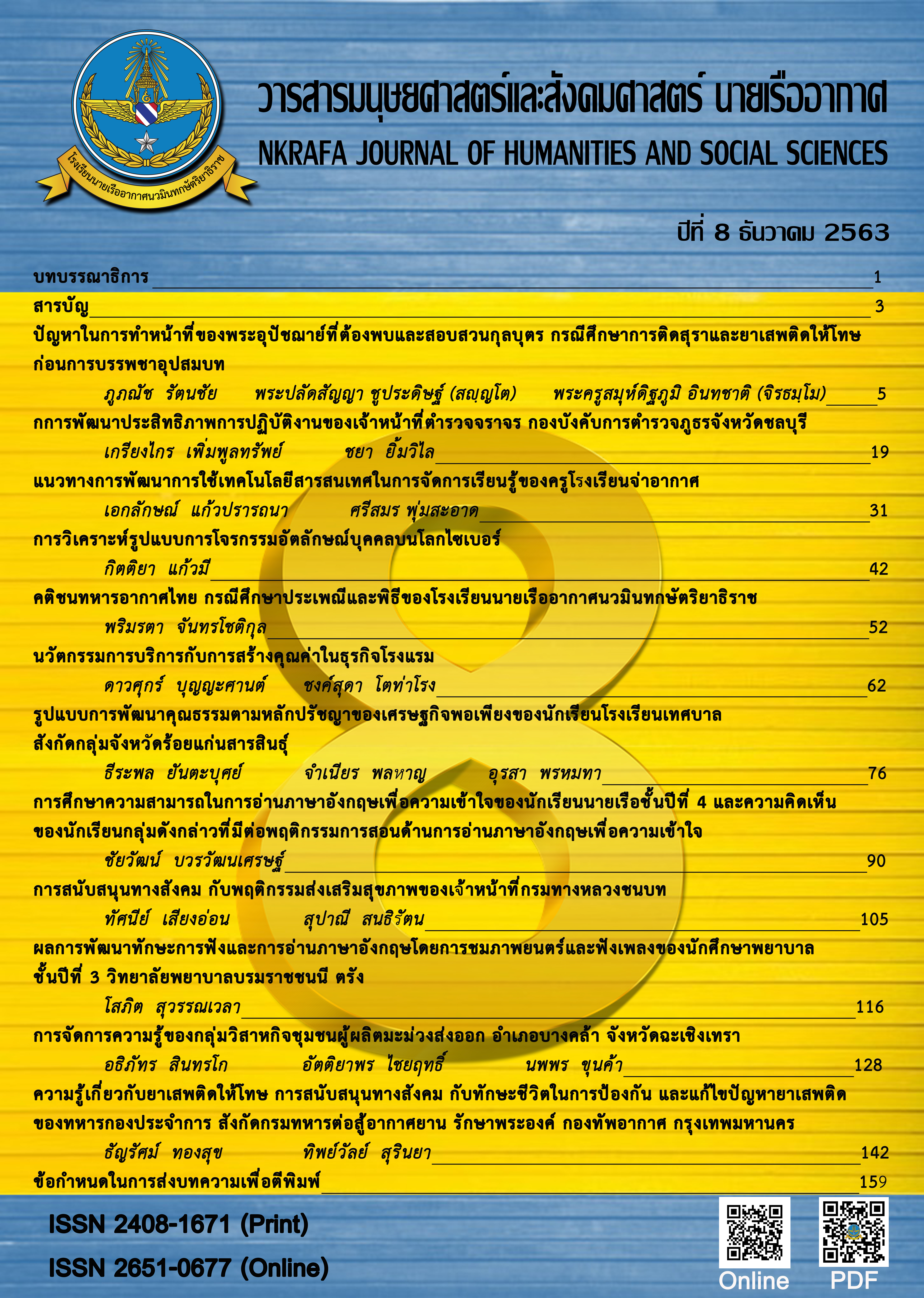Service Innovation and Value Creation in Hotel Business
Main Article Content
Abstract
Nowadays hotel operators in Thailand have been confronted with a change and an intense competition in hotel industry as well as the increase of new entrants from other industry to usurp the market share. In order to survive, it is necessary for the hotel operators to enhance their competitiveness. The purpose of this article is to explore a pattern of creating competitiveness for hotel operators by applying the concept of Service Innovation which is a strategy that helps an organization to create a differentiation and enhance a competitive advantage. To beat a competition, this concept focuses on creating customer value as well as economic value for entrepreneurs. This article also presents analytical approaches and its implications through related literatures and a case study of hotels. The study found that the key success depends on 1) ability to balance the use of technological and non-technological innovation 2) customer value proposition and economic value for entrepreneurs 3) capability and readiness of organization to create innovation and 4) strategic human resources management.
Article Details
บทความที่ได้รับการตีพิมพ์เป็นลิขสิทธิ์ของวารสารมนุษยศาสตร์และสังคมศาสตร์ นายเรืออากาศ
ข้อความที่ปรากฎในบทความแต่ละเรื่องในวารสารวิชาการเล่มนี้ เป็นความคิดเห็นส่วนตัวของผู้เขียนแต่ละท่าน ไม่เกี่ยวข้องกับโรงเรียนนายเรืออากาศฯ และคณาจารย์ท่านอื่น ๆในโรงเรียนนายเรืออากาศฯ แต่อย่างใด ความรับผิดชอบขององค์ประกอบทั้งหมดของบทความแต่ละเรื่องเป็นของผู้เขียนแต่ละท่าน หากมีความผิดพลาดใด ๆ ผู้เขียนแต่ละท่านจะรับผิดชอบบทความของตนเองแต่เพียงผู้เดียว
References
World Tourism Organization. “UNWTO Tourism Highlights 2016 Editions”. Madrid Spain: World Tourism
Organization., 2016.
กระทรวงท่องเที่ยวและกีฬา, ยุทธศาสตร์การท่องเที่ยวไทย พ.ศ.2558-2560. กรุงเทพฯ: กระทรวงท่องเที่ยวและกีฬา.2558
ฐานเศรษฐกิจ. 2559 (2 มีนาคม), “ปี’59 ธุรกิจโรงแรมเติบโตร้อยละ 4.7-6.0 การลงทุนต่างจังหวัดขยายตัว”. [Online]. Available: http://www.thansettakij.com/2016/03/02/34817 [Accessed: 15 พฤศจิกายน 2559].
ศูนย์วิจัยกสิกรไทย, “SME พร้อมปรับกลยุทธ์รับมือการแข่งขันสูงของธุรกิจโรงแรม”. [Online]. Available: http://www.kasikornbank.com/TH/SME/KSMEKnowledge [Accessed: 1พฤศจิกายน 2559].
ผู้จัดการออนไลน์, “ซี.พี.แลนด์ฯ ลุยธุรกิจโรงแรม ชิงเค้กโลว์คอสต์โฮเทล ปตท.ยันไม่ล้มแผนปักธงในยุโรป”. [Online]. Available: http://www.manager.co.th/iBizChannel/ViewNews.aspx?NewsID= 9590000065103 [Accessed: 15 พฤศจิกายน 2559].
Sanjeev, G., & Randyopadhyay., R., “Innovations in the Indian hospitality industry: an overview”. Worldwide
Hospitality and Tourism Themes, 8, pp. 408-415, 2016.
Hauser, J., Telllis, G., & Sun, Y., “Hospitality teams: Knowledge sharing and service innovation performance”.
Tourism Management, 30, pp. 41-50, 2009.
Mansury, M.A., & Love, J.H., “Innovation, productivity and growth in US business service: A firm-level
analysis”. Technovation, 28, pp. 52-62,2008.
Drejer, I., “Identify innovation in survey of services: A Schumpeterian perspective”. Research Policy, 33(3)
pp. 551-562, 2004.
Chen, Y.G., Chen, Z., Ho, J.C. & Lee, C., “In-depth Tourism’s Influences on service innovation”. International Journal of Culture, Tourism and Hospitality Research, 3(4), pp.326-336, 2009.
Droege, H., Heldebrand, D., & Forcada, M.A.H., “Innovation in services: present findings, and future
pathways”. Journal of Service Management, 20(2), pp. 131-155, 2009.
Miozzo, M. & Soete, L., “Internationalization of services: a technological perspective”. Technological
Forecasting and Social Change, 67(2/3), pp. 159-185, 2001.
Sundbo, J., Orifial-Sintes, F., & Sorensen, F., “The innovation behavior of tourism firms – Comparative studies
of Denmark and Spain”. Research Policy, 36(1), pp. 88-106, 2007.
Den Hertog, P., “Knowledge-intensive business services as co-producers of innovation”. International Journal of Innovation Management, 4, pp. 491-528, 2000.
วลัยลักษณ์ รัตนวงศ์, ณัฐธิดา สุวรรณโณ และธีรศักดิ์ จินดาบท, “การวัดนวัตกรรมการบริการของธุรกิจท่องเที่ยวไทย: วิสาหกิจขนาดกลางและย่อม”. วารสารวิทยาการจัดการ, ปีที่ 31, ฉบับที่ 1, มกราคม-มิถุนายน, 2557.
Melton, H., & Hartline, M.D., “Customer and employee co-creation of radical service innovation”. Journal of
Service Marketing, 29(2), pp. 112-123, 2015.
Kotler, P., Bowen, J., & Maken, J., Marketing for hospitality and tourism, Upper Saddle River, NJ. Prentice
Hall, 2006.
Ottenbacher, M., “Innovation management in the hospitality industry: Different strategies for achieving
success”. Journal of Hospitality & Tourism Research, 31(4), pp. 431-454, 2007.
OECD, “Service innovation and non-technological innovation”. OECD Science, Technology and Industry
Outlook 2012, pp. 167-169, 2012.
กวีวุฒิ เต็มภูวภัทร, “นักวางแผนกลยุทธ์องค์กร”, บริษัท ปตท.สำรวจและผลิตปิโตรเลียม จำกัด (มหาชน),
บรรยาย, 8 พฤศจิกายน2559.
Travel Weekly Asia. “The Age of Great Change” [Online]. Available: http://www.travelweekly-
asia.com/Travel-News/The-Age-of-Great-Change. [Accessed: June 1, 2014).
OCDE., The Emerging Middle Class in Developing Countries, OCDE, Paris, 2010.
Sharma, D. “Enhancing customer experience using technological innovations: A study of the Indian hotel
industry”. Worldwide Hospitality and Tourism Themes, 8(4), pp.469-480, 2016.
Ottenbacher, M., & Gnoth, J. “How to Develop Successful Hospitality Innovation”. Cornell Hotel and
Restaurant Administration Quarterly, 46(2), pp. 205-222, 2005
Leavy, B. “Value pioneering – How to Discover Your Own “Blue Ocean”: Interview with W. Chan Kim and Renee Mauborgne”. Strategy & Leadership, 33(6), pp. 13-20, 2005.
Gupta, S., & Lehmann, D.R., Managing Customers as Investments: The Strategic Value of Customer in the Long Run. Upper Saddle River, NJ, USA: Wharton School. Publishing, 2005.
Parasuraman, A., Zeithaml, V.A., & Berry, L.. “A conceptual model of service quality and its implication for future research”. Journal of Marketing, 49(4), pp. 899-929, 1985
Lo, A.S., Stalcup, L.D., & Lee, A.”Customer Relationship Management for Hotels in Honk Kong”. In-ternational Journal of Contemporary Hospitality Management, 22(2), pp. 139-159, 2010.
Enz, C.A. “Strategies for the Implementation of Service Innovations”. Cornell Hospitality Quarterly, 53(3), pp. 187-195, 2012.
Stutzman, F. “An Evaluation of Identity-Sharing Behavior in Social Network Communities”. International Digital and Media Arts Journal, 3(1), pp. 10-18, 2006.
Mungall, A., & Labben, T.G. “Hotel offer adjustments for senior citizen guests: perception of Swiss hoteliers”. In Advances in Hospitality and Leisure. Published online: 09 Mar 2015, pp. 223-239, 2009.
Melterm, C., & Tahir, A. “Does the importance of hotel attributes differ for senior tourists?”. International Journal of Contemporary Hospitality Management, 26(4), pp. 610-628, 2014.
Schumpeter, J.A., The Theory of Economic Development: An Inquiry into Profit, Capital, Credit, Interest and the Business Cycle, Harvard University Press, Cambridge, MA., 1934.
Schmidt, T., & Rammer, C. (2007). “Non-Technological and Technological Innovation: Strange Bedfellows?” [Online]. Available: http://dx.doi.org/10.2139/ ssrn.1010301
Leaders Magazine. “An Interview with Ed Baten, General Manager” [Online]. Available: http://www.leadersmag.com/issues/2016.1_Jan/Hospitality/LEADERS-Baten-Bunce-Maggi-W-Hotels.html [Accessed : Jan 1, 2016).
Lewis, R. A., & Mottier, E. M., “A “hotel within a hotel” in Bangkok. Emerging Markets Case Studies Collection”. Retrieved November 20, 2016, from Emerald database, 2012.
Smith, D., Exploring Innovation. Berkshire: McGraw-Hill Education, 2006.
Subramanian, N., Gunasekaran, A., & Gao, Y. “Innovative service satisfaction and customer promotion behavior in the Chinese budget hotel: an empirical study”. Int. J. Production Economics, 171, pp.201-210, 2016.


